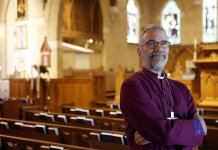On Wednesday morning, November 6, 2019, His Beatitude and our Father the Patriarch of Jerusalem Theophilos addressed the Meeting “Majma” of the Anglican Church in Jerusalem and the Middle East, which took place in Bristol Hotel in Amman, after the invitation and welcoming reception of the Most Reverend Bishop Suheil Dawani, with the following address in English;
“Your Grace, Archbishop Suheil,
Your Eminences,
Your Graces,
Dear Father Hosam,
Reverend Fathers,
Sisters and Brothers,
We greet you, dear Archbishop Suheil, and your clergy and people, as you gather for your annual synod. We join with you in welcoming your distinguished guests for the Anglican Community around the world.
We would like to take this opportunity first of all to underline the importance of the relationship that exists between the Orthodox Church and the Anglican Community, and especially between the Patriarchate of Jerusalem and the Episcopal Diocese of Jerusalem and the Middle East. Needless to say, this relationship has born much fruit over the years, and most especially recently, as we have stood together in the face of challenges to the freedom and the rights of the Church in our region.
We thank you, dear Archbishop Suheil, for your solidarity and strength of purpose, and we give thanks to Almighty God for the blessings we enjoy in our close collaboration.
We also pay tribute today to His Majesty King Abdullah II of the Hashemite Kingdom of Jordan, where we enjoy the freedom to gather from all over our region, and where His Majesty, the Custodian over Muslim and Christian Holy Sites in the Holy Land, ensures religious freedom and supports the historic rights of the Church and the guarantee of the Christian presence.
You have chosen as your theme “Becoming a living sacrifice” (Romans 12:1), and this is a timely subject for all of us who call the Holy Land and the Middle East, which is the cradle of Christianity, our home.
We cannot understand the meaning of sacrifice without first referring to our Lord’s sacrifice on the Cross. We see in this divine sacrifice the power of humility, and we understand humility through metanoia. Let us listen to the Lord’s words, “I have come to call not the righteous but sinners to repentance” (Luke 5:32). Humility and metanoia are the key to salvation, and without them nothing else is possible. The deeper we are shaped by humility and metanoia, the more available we are to God as those who can offer ourselves in sacrificial commitment and service to others.
As the Church Fathers teach us, sacrifice has many expressions. There is the sacrifice of self-giving service to others. There is the sacrifice that is the martyrdom of conscience. There is the sacrifice of costly commitment. Saint John Chrysostom says; “As we read in the words of Saint Paul, our sacrifice is a living one, holy and pleasing to God”. Chrysostom emphasizes that one should not think of sacrifice as the slaughtering of our bodies, but as following the commandments of the Lord, which lead to our salvation and deification.
Sacrifice can be personal, and it can be corporate, but it never means giving up our integrity, for our personal and corporate sacrificial acts are to be understood in and through Christ.
It must be borne in mind that the purpose of the Church is precisely a sacrificial vocation, and this is why the Church is, and should be, a sign and inspiration for political and civic leadership as we see conflicts all over our world, where disorder and confusion are so common a human experience. It is in this context that we consider our role and responsibility as spiritual leaders and priests. For the key to promoting the values of the Bible that are threatened, values like peace and justice, is precisely this kenotic tendency, and this kenosis must begin with ourselves. We do know that we cannot demand sacrifice from another; we can only live the sacrificial way of Christ ourselves, so that the Church may be a true beacon of light and hope. We must ourselves be a paradigm – as Saint Paul says, “Be imitators of me as I am of Christ” (1 Cor. 11:1).
To be imitators of Christ is indeed itself a work of sacrifice, and Christians who face trouble and persecution on a daily basis should remain firm in this vocation, because “our citizenship is in heaven, and it is from there that we are expecting a Saviour, the Lord Jesus Christ” (Phil. 3:20). As our Lord says, “Do not fear those who kill the body but cannot kill the soul” (Mat. 10:28).
Thank you for the kind invitation to be with you. May God bless you, dear Archbishop Suheil, and all the good servants in the vineyard of the Lord, that is your clergy and people, as you seek to live more deeply the mystery of Christ’s sacrificial life in your own”.










